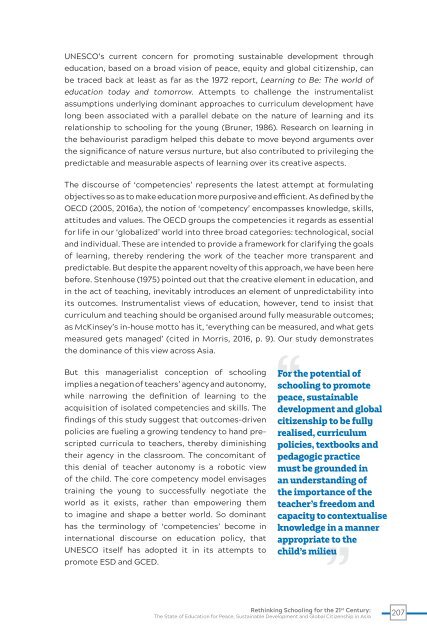Rethinking Schooling for the 21st Century
UNESCO MGIEP officially launched 'Rethinking Schooling for the 21st Century: The State of Education, Peace and Sustainable Development and Global Citizenship' in 2017 at the UNESCO General Conference. This study analyses how far the ideals of SDG 4.7 are embodied in policies and curricula across 22 Asian countries and establishes benchmarks against which future progress can be assessed. It also argues forcefully that we must redefine the purposes of schooling, addressing the fundamental challenges to efforts to promote peace, sustainability and global citizenship through education.
UNESCO MGIEP officially launched 'Rethinking Schooling for the 21st Century: The State of Education, Peace and Sustainable Development and Global Citizenship' in 2017 at the UNESCO General Conference. This study analyses how far the ideals of SDG 4.7 are embodied in policies and curricula across 22 Asian countries and establishes benchmarks against which future progress can be assessed. It also argues forcefully that we must redefine the purposes of schooling, addressing the fundamental challenges to efforts to promote peace, sustainability and global citizenship through education.
You also want an ePaper? Increase the reach of your titles
YUMPU automatically turns print PDFs into web optimized ePapers that Google loves.
UNESCO’s current concern <strong>for</strong> promoting sustainable development through<br />
education, based on a broad vision of peace, equity and global citizenship, can<br />
be traced back at least as far as <strong>the</strong> 1972 report, Learning to Be: The world of<br />
education today and tomorrow. Attempts to challenge <strong>the</strong> instrumentalist<br />
assumptions underlying dominant approaches to curriculum development have<br />
long been associated with a parallel debate on <strong>the</strong> nature of learning and its<br />
relationship to schooling <strong>for</strong> <strong>the</strong> young (Bruner, 1986). Research on learning in<br />
<strong>the</strong> behaviourist paradigm helped this debate to move beyond arguments over<br />
<strong>the</strong> significance of nature versus nurture, but also contributed to privileging <strong>the</strong><br />
predictable and measurable aspects of learning over its creative aspects.<br />
The discourse of ‘competencies’ represents <strong>the</strong> latest attempt at <strong>for</strong>mulating<br />
objectives so as to make education more purposive and efficient. As defined by <strong>the</strong><br />
OECD (2005, 2016a), <strong>the</strong> notion of ‘competency’ encompasses knowledge, skills,<br />
attitudes and values. The OECD groups <strong>the</strong> competencies it regards as essential<br />
<strong>for</strong> life in our ‘globalized’ world into three broad categories: technological, social<br />
and individual. These are intended to provide a framework <strong>for</strong> clarifying <strong>the</strong> goals<br />
of learning, <strong>the</strong>reby rendering <strong>the</strong> work of <strong>the</strong> teacher more transparent and<br />
predictable. But despite <strong>the</strong> apparent novelty of this approach, we have been here<br />
be<strong>for</strong>e. Stenhouse (1975) pointed out that <strong>the</strong> creative element in education, and<br />
in <strong>the</strong> act of teaching, inevitably introduces an element of unpredictability into<br />
its outcomes. Instrumentalist views of education, however, tend to insist that<br />
curriculum and teaching should be organised around fully measurable outcomes;<br />
as McKinsey’s in-house motto has it, ‘everything can be measured, and what gets<br />
measured gets managed’ (cited in Morris, 2016, p. 9). Our study demonstrates<br />
<strong>the</strong> dominance of this view across Asia.<br />
But this managerialist conception of schooling<br />
implies a negation of teachers’ agency and autonomy,<br />
while narrowing <strong>the</strong> definition of learning to <strong>the</strong><br />
acquisition of isolated competencies and skills. The<br />
findings of this study suggest that outcomes-driven<br />
policies are fueling a growing tendency to hand prescripted<br />
curricula to teachers, <strong>the</strong>reby diminishing<br />
<strong>the</strong>ir agency in <strong>the</strong> classroom. The concomitant of<br />
this denial of teacher autonomy is a robotic view<br />
of <strong>the</strong> child. The core competency model envisages<br />
training <strong>the</strong> young to successfully negotiate <strong>the</strong><br />
world as it exists, ra<strong>the</strong>r than empowering <strong>the</strong>m<br />
to imagine and shape a better world. So dominant<br />
has <strong>the</strong> terminology of ‘competencies’ become in<br />
international discourse on education policy, that<br />
UNESCO itself has adopted it in its attempts to<br />
promote ESD and GCED.<br />
For <strong>the</strong> potential of<br />
schooling to promote<br />
peace, sustainable<br />
development and global<br />
citizenship to be fully<br />
realised, curriculum<br />
policies, textbooks and<br />
pedagogic practice<br />
must be grounded in<br />
an understanding of<br />
<strong>the</strong> importance of <strong>the</strong><br />
teacher’s freedom and<br />
capacity to contextualise<br />
knowledge in a manner<br />
appropriate to <strong>the</strong><br />
child’s milieu<br />
<strong>Rethinking</strong> <strong>Schooling</strong> <strong>for</strong> <strong>the</strong> 21 st <strong>Century</strong>:<br />
The State of Education <strong>for</strong> Peace, Sustainable Development and Global Citizenship in Asia<br />
207

















